|
|
|
Sort Order |
|
|
|
Items / Page
|
|
|
|
|
|
|
| Srl | Item |
| 1 |
ID:
061875
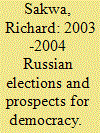

|
|
|
| 2 |
ID:
170677
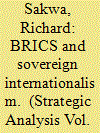

|
|
|
|
|
| Summary/Abstract |
The article outlines four types of globalism contending for hegemony today. The struggle of what effectively represents different types of international order is one reason why international politics today looks so disordered. The BRICS association is firmly located as part of one of these orders, that of sovereign internationalism, but is challenged by the disruptive implications of the Trumpian mercantilist order. BRICS and its members as a result are drawing closer to the liberal internationalist model. However, this is made more difficult by liberalism’s shift towards some of the Trumpian exclusionary agenda. Despite some inner contradictions, the BRICS is one of the institutional and normative cornerstones of sovereign internationalism.
|
|
|
|
|
|
|
|
|
|
|
|
|
|
|
|
| 3 |
ID:
065855
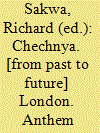

|
|
|
|
|
| Publication |
London, Anthem Press, 2005.
|
| Description |
xvii, 300p.pbk
|
| Standard Number |
1843311658
|
|
|
|
|
|
|
|
|
|
|
|
Copies: C:1/I:0,R:0,Q:0
Circulation
| Accession# | Call# | Current Location | Status | Policy | Location |
| 050142 | 947.52/SAK 050142 | Main | On Shelf | General | |
|
|
|
|
| 4 |
ID:
104195
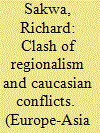

|
|
|
|
|
| Publication |
2011.
|
| Summary/Abstract |
THE RECOGNITION OF THE INDEPENDENCE OF Abkhaziya and South Ossetiya on 26
August 2008, following the five-day Russo-Georgian War (8-12 August), at a stroke
created a new dynamic in Russia's ethnic and federal relations and in the politics of the
Caucasus as a whole. Nation and state building aspirations were heightened across the
region. For the first time the independent political status of sub-national entities was
recognised in post-Soviet Eurasia, and this could come to threaten Russia itself. The
initial disintegration of Yugoslavia had occurred along the lines of the constituent
republics, but the recognition by the United States and some of its allies of Kosovo's
unilateral declaration of independence in February 2008 broke the unspoken taboo
against the recognition of sub-republican units that had governed processes of state
formation in the post-communist world (Pavkovic´ & Radan 2007, Chapter 5). The war
demonstrated that the process of the disintegration of the USSR was far from over,
but had only been 'frozen' for some two decades. Russia was now forced to deal with
Caucasian conflicts in a more fluid and broader international context, while
intensifying concerns about Russia's own territorial integrity. Although the threat
of outright separatism has waned, the adhesive bonds of the Caucasus with Russia
have also weakened (Malashenko 2009). The interconnectedness of the various
conflicts has now become evident (Cheterian 2008).
|
|
|
|
|
|
|
|
|
|
|
|
|
|
|
|
| 5 |
ID:
068422
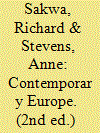

|
|
|
|
|
| Edition |
2nd ed.
|
| Publication |
Hampshire, Palgrave Macmillan, 2006.
|
| Description |
xvii, 308p.Pbk
|
| Series |
Palgrave foundations
|
| Standard Number |
9781403945675
|
|
|
|
|
|
|
|
|
|
|
|
Copies: C:1/I:0,R:0,Q:0
Circulation
| Accession# | Call# | Current Location | Status | Policy | Location |
| 051029 | 940.56/SAK 051029 | Main | On Shelf | General | |
|
|
|
|
| 6 |
ID:
189852
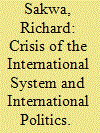

|
|
|
|
|
| Summary/Abstract |
Despite the Cold War and numerous hot wars, there is an essential continuity
in the post-war period based on the Charter International System created
in 1945. The United Nations and the associated declarations, organizations
and normative orientations remain the framework for the conduct of
international relations. At the level of international politics, orders are
created in which states contend and hegemonic formations take shape.
The Soviet-led bloc disintegrated in 1989-1991, leaving the field clear
for the U.S.-led political West to claim universality, and on that basis
seek to expand globally. However, the distinction between the system
and conjunctural political sub-order is crucial to explain the dynamics in
international affairs today.
|
|
|
|
|
|
|
|
|
|
|
|
|
|
|
|
| 7 |
ID:
138949
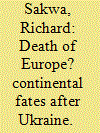

|
|
|
|
|
| Summary/Abstract |
The unravelling of the post-Cold War security order in Europe was both cause and consequence of the crisis in Ukraine. The crisis was a symptom of the three-fold failure to achieve the aspirations to create a ‘Europe whole and free’ enunciated by the Charter of Paris in 1990, the drift in the European Union's behaviour from normative to geopolitical concerns, and the failure to institutionalize some form of pan-continental unity. The structural failure to create a framework for normative and geopolitical pluralism on the continent meant that Russia was excluded from the new European order. No mode of reconciliation was found between the Brussels-centred wider Europe and various ideas for greater European continental unification. Russia's relations with the EU became increasingly tense in the context of the Eastern Partnership and the Association Agreement with Ukraine. The EU and the Atlantic alliance moved towards a more hermetic and universal form of Atlanticism. Although there remain profound differences between the EU and its trans-Atlantic partner and tensions between member states, the new Atlanticism threatens to subvert the EU's own normative principles. At the same time, Russia moved from a relatively complaisant approach to Atlanticism towards a more critical neo-revisionism, although it does not challenge the legal or normative intellectual foundations of international order. This raises the question of whether we can speak of the ‘death of Europe’ as a project intended to transcend the logic of conflict on the continent.
|
|
|
|
|
|
|
|
|
|
|
|
|
|
|
|
| 8 |
ID:
169560
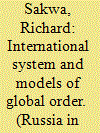

|
|
|
|
|
| Summary/Abstract |
The international system is presented as a three-story construct, with the international governance institutions at the top, states in the middle, and civil and political society and social movements at the bottom. Within this construct, four types of globalism contend for hegemony today: the liberal international order; transformative (revolutionary) internationalism; mercantilist nationalism; and conservative (or sovereign) internationalism.
|
|
|
|
|
|
|
|
|
|
|
|
|
|
|
|
| 9 |
ID:
141002
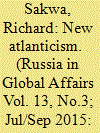

|
|
|
|
|
| Summary/Abstract |
With the end of the Cold War, it seemed that the North Atlantic Treaty Organization (NATO) had successfully achieved its purpose, above all containing the USSR, and could enter the trash can of history. Instead, the organization spent the next quarter century looking for a role for itself. It faced an existential crisis of purpose. In the mid-1990s Christopher Coker warned of the "twilight of the West," having in mind not Western civilization as such, whose decline had long ago been anticipated by Oswald Spengler and Arnold Toynbee, but the Atlantic community as the political and cultural foundation of NATO. Coker meticulously described how the idea of an "Atlantic community" had to be constructed in the post-war years, and did not enjoy the automatic allegiance of its members, in particular in Europe. It was ultimately the Soviet threat that kept the alliance together, although it was challenged by alternative projects, above all the Gaullist vision of an independent Europe responsible for its own security that at its most expensive included the Soviet Union and at its most exclusive was able to manage its affairs without the United States. By the end of the Cold War, moreover, the countries making up the alliance were undergoing major demographic changes that turned them into multicultural societies, with diverse orientations that weakened the traditional focus on Atlantic security. On this basis,
|
|
|
|
|
|
|
|
|
|
|
|
|
|
|
|
| 10 |
ID:
081387
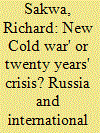

|
|
|
|
|
| Publication |
2008.
|
| Summary/Abstract |
President Vladimir Putin's foreign policy can be characterized as a 'new realism', repudiating some of the exaggerated ambitions of Yevgeny Primakov's tenure as foreign minister in the late 1990s while asserting Russia's distinctive identity in world politics. Rather than acting as a classic 'balancing' power prescribed by classic realist theory as the response to the hegemonic power of a single state, Russia under Putin tended to 'bandwagon' and the country has been a vigorous 'joiner'. Putin insisted that Russia retains its 'autonomy' in international politics while moving away from earlier ideas that Russia could constitute the kernel of an alternative power bloc. However, the opportunity to integrate Russia into the hegemonic international order may have been missed because of what is seen in Moscow as the resolute hostility of groups in the West who continue to pursue Cold War aims of isolating and containing Russia. The Cold War was transcended in an asymmetrical manner, and this has given rise to four major failures: political, strategic, intellectual and cultural. The world faces the danger of the onset of a new era of great power bloc politics, thus restoring a Cold War structure to the international system. With none of the major strategic issues facing the international community at the end of the Cold War yet resolved, we may be facing a new twenty years' crisis.
|
|
|
|
|
|
|
|
|
|
|
|
|
|
|
|
| 11 |
ID:
163421


|
|
|
|
|
| Summary/Abstract |
The crisis in relations between Russia and the European Union (EU) is part of the broader breakdown of the post-Cold War security order. This commentary focuses on structural interpretation and identifies four interlinked processes shaping the crisis: tension between the logic of the enlargement and transformation; a dynamic of involution and resistance; the problem of monism, whereby the expanding self is unable adequately to engage with the un-integrated other; and the recent emergence of ‘other Europes’ that may potentially overcome involution. The erosion of the Atlantic system provides an opportunity for delayed institutional and ideational innovation.
|
|
|
|
|
|
|
|
|
|
|
|
|
|
|
|
| 12 |
ID:
112787
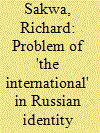

|
|
|
|
|
| Publication |
2012.
|
| Summary/Abstract |
A new era in international politics is gradually taking shape in which the legacy of the Cold War is gradually fading, but in which new lines of division are emerging. The major institutions of the Cold War period are undergoing a long decay although the political processes associated with them are becoming increasingly dysfunctional. New forms of multi-polarity are taking shape accompanied by the struggle between defenders of the status quo and those ready to adapt to the structural revisionism inherent in the new pattern of international politics. In all of this, Russia acts as the bellwether, developing as a distinct and separate pole in the international system rather than joining the Western constellation, as was anticipated after the end of the Cold War. Russia's great power identity in the international system is accompanied by domestic systemic specificities, which reinforce differentiation at the structural level. Russia's neo-revisionism does not repudiate the present balance in international order, but seeks to create what it considers to be a more comprehensive and equal system. This can be seen in its various forms of interaction and modes of engagement with 'the international'. In methodological terms, the attempt to analyse these changes through a Cold War lens is a categorical error that perpetuates anachronistic paradigms. By disaggregating Russia's engagement with the international into a number of distinct processes, we can delineate more clearly the interaction of structural and systemic factors that sustain Russia's neo-revisionism.
|
|
|
|
|
|
|
|
|
|
|
|
|
|
|
|
| 13 |
ID:
051284
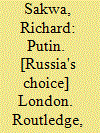

|
|
|
|
|
| Publication |
London, Routledge, 2004.
|
| Description |
xi, 307p.hbk
|
| Standard Number |
0415296633
|
|
|
|
|
|
|
|
|
|
|
|
Copies: C:1/I:0,R:0,Q:0
Circulation
| Accession# | Call# | Current Location | Status | Policy | Location |
| 048032 | 947.086092/SAK 048032 | Main | On Shelf | General | |
|
|
|
|
| 14 |
ID:
084636
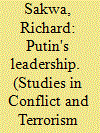

|
|
|
| 15 |
ID:
084643
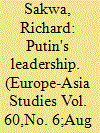

|
|
|
| 16 |
ID:
136927
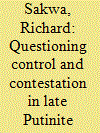

|
|
|
|
|
| Summary/Abstract |
The Putin system is based on control and the ‘manual’ management of political processes. In part this was a response to what was perceived to be the ‘anarcho-democracy’ of the 1990s, but it was also an attempt to find a way of dealing with more immediate challenges of societal and political management. The regime devised a whole series of strategies for dealing with opposition, ranging from cooptation to coercion. The ideological framework was a distinctive form of neo-Soviet depoliticisation based on an inclusive ‘centrism’. This model of political management was challenged during the 2011–2012 electoral cycle by a mass protest movement and a degree of intra-elite political contestation. This was accompanied by the radicalisation of a traditionalist counter-movement accompanied by a revanchist spirit at the heart of Putin's centrist coalition, which spawned a range of restrictive legislation in the Sixth Duma from 2012.
|
|
|
|
|
|
|
|
|
|
|
|
|
|
|
|
| 17 |
ID:
048361
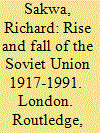

|
|
|
|
|
| Publication |
London, Routledge, 1999.
|
| Description |
xxi, 521p.hbk
|
| Series |
Routledge Sources in History
|
| Standard Number |
0415122899
|
|
|
|
|
|
|
|
|
|
|
|
Copies: C:1/I:0,R:0,Q:0
Circulation
| Accession# | Call# | Current Location | Status | Policy | Location |
| 041612 | 947.084/SAK 041612 | Main | On Shelf | General | |
|
|
|
|
| 18 |
ID:
049047
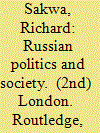

|
|
|
|
|
| Edition |
2nd
|
| Publication |
London, Routledge, 1996.
|
| Description |
xvii, 501p.
|
| Standard Number |
041515483
|
|
|
|
|
|
|
|
|
|
|
|
Copies: C:1/I:0,R:0,Q:0
Circulation
| Accession# | Call# | Current Location | Status | Policy | Location |
| 039982 | 320.0947/SAK 039982 | Main | On Shelf | General | |
|
|
|
|
| 19 |
ID:
083180
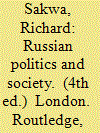

|
|
|
|
|
| Edition |
4th ed.
|
| Publication |
London, Routledge, 2008.
|
| Description |
xi, 585p.
|
| Standard Number |
9780415415286
|
|
|
|
|
|
|
|
|
|
|
|
Copies: C:1/I:0,R:0,Q:0
Circulation
| Accession# | Call# | Current Location | Status | Policy | Location |
| 053823 | 320.947/SAK 053823 | Main | On Shelf | General | |
|
|
|
|
| 20 |
ID:
106277
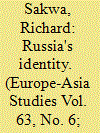

|
|
|
|
|
|
|
|